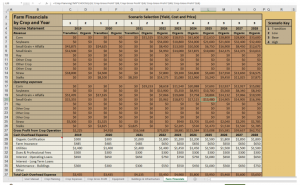This week’s blog entry is from a guest writer. If you are interested in your article or blog entry being featured on the TLC blog, contact nicole@thelandconnection.org.
By: Jody Padgham, Department of Plant Pathology, University of Wisconsin-Madison
Anyone looking at a transition to or startup in successful organic grain production must be prepared for a significant amount of decision making. What grain crops to grow, in what rotations, what weed and pest management strategies to undertake, what equipment needed, how to build soil structure and fertility, among other decisions will occupy the mind. Many grain farmers we work with at OGRAIN (Organic Grain Resource and Information Network based at UW-Madison) tell us that once they get used to it, they really enjoy collecting new knowledge and digging into the heavy thinking and decision making that leads to organic success.
The decisions that lead to successful organic grain crops must also add up to the operation’s financial success. Resources and tools to assist in understanding the financial consequences of decisions have been hard to find. Until now, as OGRAIN unveils the Organic Grain Compass, and soon available Turning Grain into Dough supporting workbook.
A talented team under leadership from University of Wisconsin Organic Systems Lab staff planned and developed these new comprehensive decision-making tools in the form of a budgeting and financial-forecasting spreadsheet supported by a workbook offering comprehensive background information.
This financial spreadsheet helps guide users to informed decisions and a promising financial future. Modeled after the successful Veggie Compass, the financial spreadsheet allows farmers to input their own data and explore various financial consequences that would result from possible cropping choices.
Producers begin with the OGRAIN Compass by entering numbers of acres planned for a diversity of crops, estimating production costs, yields and sale prices. The producer has a choice of estimating yields and prices at “low” “base” and “high” levels, reflecting the kind of year-to-year variation inherent in farming. Ten years of production estimates allow experimentation with different rotations to explore changes in profitability and overall financial outcomes over time.

The tool allows the observation of long-term financial consequences of diverse rotations. At times the need for a specific rotation for a production reason, such as weed control or green manure fertility, or the application of specific fertility inputs might leave a temporary dip in annual income for a specific field, but actually add to the overall income of that field over time as anticipated yields of other crops in the rotation increase. The Compass tool will help in exploring the averaged financial result.Listings of equipment, buildings and infrastructure used are combined with depreciation rates to round out the data entered. The final page of the Compass tool summarizes per crop revenues, expenses and net returns. A comprehensive set of instructions steps the producer through each page of the spreadsheet tool.
The Turning Grain into Dough supporting workbook, planned for release in April, will include important background information, comparative financials, investment scenarios, foreseeable production changes, and common financial challenges.
Created by Jim Munsch and John Hendrickson, developers of the bench-marking and decision-making tool Veggie Compass: Whole Farm Profit Management with help from agricultural finance expert, Paul Dietmann, author of Fearless Farm Finances: Farm Financial Management Demystified, and Dr. Erin Silva and Jody Padgham from the UW Organic Systems Lab, the OGRAIN Compass and workbook are available free from the OGRAIN website.
Those interested in organic grain production can join the active and informative OGRAIN listserv by emailing join-ograin@lists.wisc.edu . This project has been supported by a grant from the USDA Beginning Farmer and Rancher Development Program grant number 2017-70017-26856. For more information or questions, contact Jody Padgham at padgham@wisc.edu.



